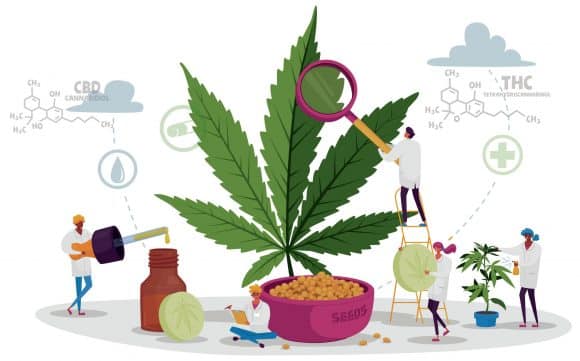
Can Cannabis Really Help or Is It Just Hype?
Cannabis, commonly known as marijuana, has been a controversial topic for decades. It’s known for its psychoactive properties, which make it a popular recreational drug. However, there has been a growing interest in the potential medical benefits of cannabis. Many researchers, healthcare professionals, and patients claim that cannabis can help with various health conditions, including chronic pain, anxiety, and depression. But is cannabis really effective, or is it just hype?
What is Cannabis?
Cannabis is a plant that contains several compounds, called cannabinoids, including tetrahydrocannabinol (THC) and cannabidiol (CBD). THC is the psychoactive component of cannabis that causes the “high” or euphoric feeling associated with marijuana use. On the other hand, CBD is non-psychoactive and does not produce a high.
Cannabis has been used for various purposes throughout history, including for medical and spiritual purposes. In recent years, it has become increasingly popular as a recreational drug and has been legalized for medical or recreational use in several states and countries.
The Potential Benefits of Cannabis
There is growing evidence to suggest that cannabis may have several potential health benefits, particularly for individuals with certain medical conditions. Here are some of the most common uses of cannabis:
Pain Relief
Chronic pain is a common health condition that affects millions of people worldwide. It can significantly impact an individual’s quality of life and ability to function normally. Research suggests that cannabis may help with pain relief by reducing inflammation and interacting with the body’s endocannabinoid system, which plays a role in pain regulation.
Several studies have found that cannabis can help reduce chronic pain, including pain caused by multiple sclerosis, neuropathic pain, and cancer-related pain. In a study published in the Journal of Pain, researchers found that cannabis was effective in reducing chronic pain in patients with conditions such as fibromyalgia and neuropathy.
Anxiety and Depression
Anxiety and depression are two of the most common mental health conditions, affecting millions of people worldwide. While there are several medications available to treat these conditions, some individuals may prefer natural alternatives. Cannabis may be one such alternative.
Research suggests that cannabis may help with anxiety and depression by interacting with the brain’s neurotransmitters and reducing stress levels. A study published in the Journal of Affective Disorders found that cannabis use was associated with lower levels of anxiety, depression, and stress.
Epilepsy
Epilepsy is a neurological disorder that affects the brain’s electrical activity, resulting in seizures. It can be challenging to treat, and many individuals with epilepsy do not respond well to traditional medications. However, there is growing evidence to suggest that cannabis may help with epilepsy.
In 2018, the United States Food and Drug Administration (FDA) approved Epidiolex, a CBD-based medication, for the treatment of two rare forms of epilepsy, Lennox-Gastaut syndrome, and Dravet syndrome. Several studies have also found that cannabis can help reduce seizures in individuals with epilepsy.
Nausea and Vomiting
Nausea and vomiting are common side effects of chemotherapy, radiation therapy, and certain medications. They can significantly impact an individual’s quality of life and make it challenging to complete treatment. Cannabis may help with nausea and vomiting by interacting with the body’s endocannabinoid system.
A review of several studies published in the Cochrane Database of Systematic Reviews found that cannabis was effective in reducing nausea and vomiting caused by chemotherapy. However, more research is needed to determine the optimal dose and method of administration.
 Frequently asked questions about cannabis use:
Frequently asked questions about cannabis use:
- Is cannabis addictive? While not everyone who uses cannabis will become addicted, it is possible to develop a substance use disorder. People who use cannabis frequently or in high doses may be at a greater risk of developing an addiction. Withdrawal symptoms such as irritability, insomnia, and loss of appetite can also occur when someone stops using cannabis after prolonged use.
- Can cannabis be used for medical purposes? Yes, cannabis has been used for medicinal purposes for centuries, and there is growing research to support its use for a variety of health conditions such as chronic pain, nausea and vomiting caused by chemotherapy, and muscle spasms in multiple sclerosis. However, the use of cannabis for medical purposes should be guided by a healthcare professional and based on the specific needs of each individual.
- What are the legal implications of using cannabis? The legality of cannabis use varies by country and state. In some places, cannabis is legal for medical or recreational use, while in others it is completely illegal. Even in places where cannabis is legal, there may be restrictions on how much a person can possess, where it can be consumed, and how it can be purchased. It’s important to understand the laws regarding cannabis use in your area to avoid any legal consequences.
Further reading:
- National Institute on Drug Abuse. (2020). Marijuana. Retrieved from https://www.drugabuse.gov/drug-topics/marijuana
- Mayo Clinic. (2021). Medical marijuana. Retrieved from https://www.mayoclinic.org/healthy-lifestyle/consumer-health/in-depth/medical-marijuana/art-20137855
- Russo, E. B. (2008). Cannabinoids in the management of difficult to treat pain. Therapeutics and Clinical Risk Management, 4(1), 245-259.
- Boehnke, K. F., Scott, J. R., Litinas, E., Sisley, S., & Williams, D. A. (2019). Medicinal use of cannabis in the United States: historical perspectives, current trends, and future directions. Journal of opioid management, 15(2), 113-118.
- Blessing, E. M., Steenkamp, M. M., Manzanares, J., & Marmar, C. R. (2015). Cannabidiol as a potential treatment for anxiety disorders. Neurotherapeutics, 12(4), 825-836.
- Chagas, M. H. N., Crippa, J. A. S., Zuardi, A. W., Hallak, J. E. C., Machado-de-Sousa, J. P., Hirotsu, C., … & Andersen, M. L. (2014). Effects of acute systemic administration of cannabidiol on sleep-wake cycle in rats. Journal of Psychopharmacology, 28(11), 1219-1231.
- Devinsky, O., Cross, J. H., Laux, L., Marsh, E., Miller, I., Nabbout, R., … & Wright, S. (2017). Trial of cannabidiol for drug-resistant seizures in the Dravet syndrome. New England Journal of Medicine, 376(21), 2011-2020.
- U.S. Food and Drug Administration. (2018). FDA approves first drug comprised of an active ingredient derived from marijuana to treat rare, severe forms of epilepsy. Retrieved from https://www.fda.gov/news-events/press-announcements/fda-approves-first-drug-comprised-active-ingredient-derived-marijuana-treat-rare-severe-forms
- Smith, L. A., Azariah, F., Lavender, V. T., Stoner, N. S., & Bettiol, S. (2015). Cannabinoids for nausea and vomiting in adults with cancer receiving chemotherapy. Cochrane Database of Systematic Reviews, 11, CD009464.

